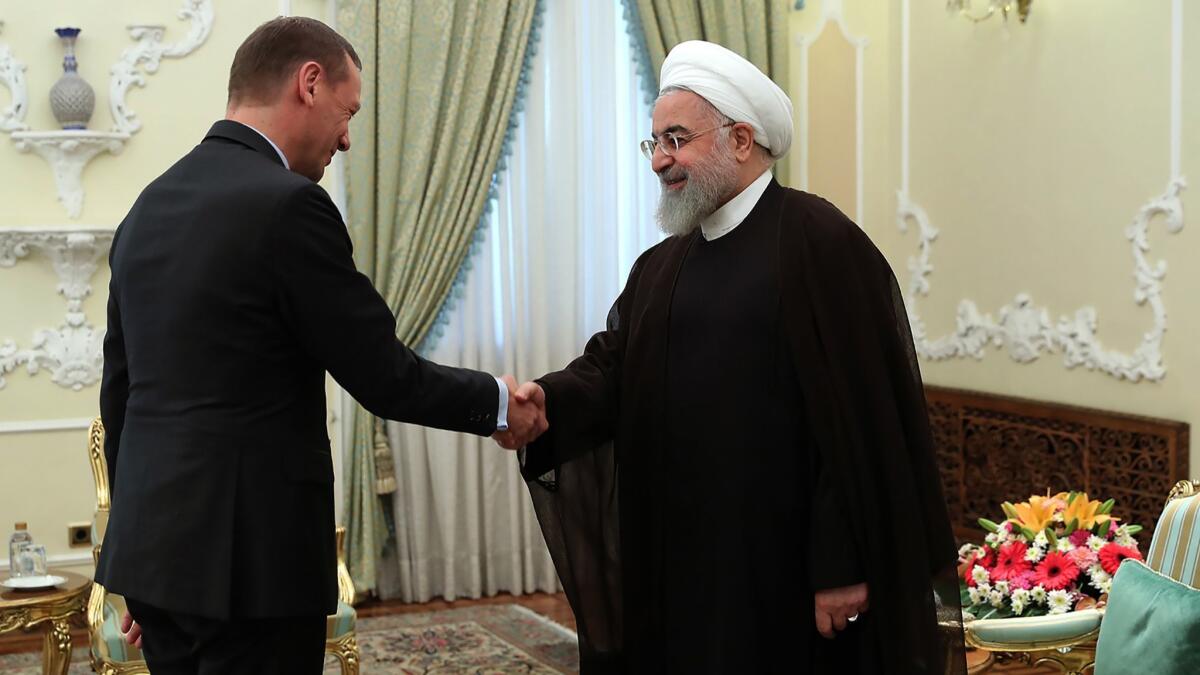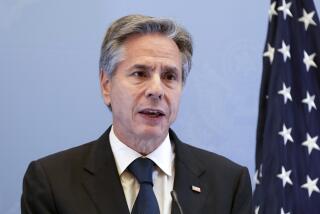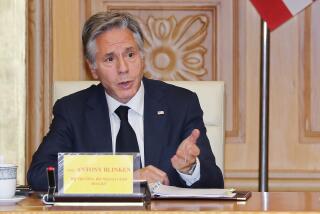Europe wants to establish a trade conduit with Iran. Here’s what that means

Reporting from Beirut — As Iran presses on with its gradual dismantling of terms set by the 2015 nuclear deal, and while tensions with the U.S. increase ever higher, European signatories say a new financial mechanism can salvage the accord.
That mechanism, INSTEX, aims to provide Iran with an incentive to stay in the Joint Comprehensive Plan of Action (JCPOA), as the nuclear agreement is formally known, despite the United States’ withdrawal last year.
In May, on the anniversary of that withdrawal, Iran began a careful but escalating campaign of enriching and stockpiling uranium beyond the deal’s limits.
If INSTEX doesn’t compensate Iran for staying in the deal even as the U.S. levies additional sanctions, among other measures, Tehran has threatened to walk away from the accord altogether.
What is INSTEX?
At its heart, INSTEX — the Instrument in Support of Trade Exchanges — is a clearinghouse for trade deals between Iran and Europe that allows companies to avoid payment across borders.
First established in January by Britain, France and Germany, it’s headquartered in Paris and became operational last month. The mechanism avoids use of U.S. dollars.
Iran established a mirror entity in April called the Special Trade and Finance Institute.
What does that mean?
Say you have an European company sending machinery to an Iranian importer, and an Iranian company sending pistachios to Europe.
Normally, the Iranian importer in the first deal would have to send money to Europe and the European importer would send money to Iran.
Instead, INSTEX would match those two transactions: The European importer pays for the pistachios by giving money to the European exporter. The two Iranian companies pay each other in rials.
This way there is no direct financial flow between Iran and Europe but commodities can still travel to and from Iran.
Why is this important?
In two words, “secondary sanctions.”
The U.S. has long used primary sanctions, such as asset freezes or trade embargoes that prevent U.S. companies from doing business in Iran.
Secondary sanctions target foreign — non-U.S. — entities for engaging in commercial activities or providing material support to Iran.
Punishments can include denial of visas and import/export certificates, denying these foreign entities the use of American dollars or even cutting them out of the U.S. financial system and forbidding any U.S. party from doing business with them.
Banks, especially, have been skittish.
Because a number of the large international banks have been hit substantially by sanctions over the years, they’re reluctant to engage in any business that could jeopardize their access to U.S. markets, said Doug Davison, a sanctions expert at the London-based law firm Linklaters and former SEC official. “They [the banks] have in effect become the best enforcers.”
Even though the Office of Foreign Assets Control, the U.S. governmental agency enforcing the sanctions, is small, the sanctions are open to interpretation in a way that gives it an outsize chilling effect, Davison added.
“We’ve had clients who had transactions that weren’t problematic,” he said. “But once the transactions are flagged as potentially problematic, the banks are very reluctant to process them, even if there is a good explanation, given the substantial risk in making the wrong call.”
And the complex legal requirements, which demand the attention of an army of dedicated compliance officers, along with the comparatively minor reward for doing business with Iran, mean that a deal is usually not worth the effort.
At this point, banks are so intimidated they’ll refuse dealing with a company with any exposure to Iran, even if the business it brings is completely unrelated.
So INSTEX helps Iran circumvent sanctions?
No. INSTEX, at least to start, deals with humanitarian aid, which in theory is still allowed.
“It’s designed to process transactions that are permissible under U.S. sanctions but aren’t happening because of over-compliance on the part of non-U.S. banks.,” said Jarrett Blanc, who served as the State Department’s coordinator for Iran nuclear implementation under President Obama.
Companies doing business with INSTEX would still have to demonstrate they’ve done their due diligence on who the end-user in Iran will be, said Esfandyar Batmanghelidj, an Iran expert and founder of the media company Bourse and Bazaar.
Nevertheless, coordinating transactions through INSTEX would make it easier to do them at scale, Batmanghelidj added. And because INSTEX is a European state-owned company, it would lend transactions an imprimatur that had so far been impossible to gain.
So Washington is fine with it?
Not quite.
The U.S. says that if INSTEX deals with unsanctioned commodities then it should be fine. And initially, said Richard Nephew, a research scholar and former State Department sanctions expert who was on the negotiating team for the Iran nuclear deal, there were even discussions in Washington about leveraging INSTEX to solve the issue of humanitarian trade.
“It’s pretty clear that that line of argument, held in some quarters of the administration, has lost .… We’ve clearly decided that we’re going to make as inhospitable an environment for INSTEX as we can,” Nephew said, adding that the use of Iranian financial institutions (every major Iranian bank is targeted) could trip U.S. sanctions.
“Our view of it is not that it’s a possibly useful vehicle, but a threat to the sanctions’ architecture. I don’t see a chance of that changing.”
With previous administrations, even when a severe sanctions regime like the one on Iran was in place, U.S. officials would make efforts to keep permissible trade “not just permissible but practically possible,” said Blanc.
But when Trump administration officials meet with foreign governments and banks, he said, “the way they describe the rules make it perfectly clear that, in their view, there’s no way to comply with the rules.”
“It’s making permissible trade practically impossible.”
And what are Iranian officials saying?
Mostly, they’ve been complaining that INSTEX in its current form doesn’t go far enough because it doesn’t allow Iran to sell its oil. That’s a problem; in 2017, almost 90% of the European Union’s imports from Iran — worth some 10.1 billion euros (or $11.4 billion) — were energy related, according to the European Commission.
Without that money, Iranian companies simply don’t have the cash to import anything, making INSTEX moot.
“This mechanism without money is like a beautiful car without fuel,” Majid Takht Ravanchi, Iran’s ambassador to the United Nations, said at a news conference last month, according to a report from the Islamic Republic News Agency.
Besides, other Iranian officials have insisted they intend INSTEX to be used for more than just food and medicines, and that eventually it should handle sanctioned goods.
But behind the bold statements, said Batmanghelidj, Tehran was more realistic “over INSTEX as one or part of a package of solutions.”
“The Iranians have undertaken their own efforts to set up their own vehicle,” said Batmanghlidj.
“If they fundamentally didn’t believe it couldn’t work, then they wouldn’t have gone through that whole process.”
OK, will it work?
In a sense, INSTEX formalizes and expands what has already been happening with firms doing longtime business in Iran. Many have already had to find workarounds for the sanctions by balancing transactions, said Batmanghelidj.
But it’s not expected to compensate for the devastating effects of U.S. sanctions on Iran’s economy.
The main reason for that, Nephew said, is because INSTEX is designed to remove banks from deals but does nothing to convince companies to take the risk of doing business with Iran and triggering sanctions.
“There was a theory that the only thing precluding trade with Iran was that banks were refusing to do that business because [the U.S.] scared all the banks,” Nephew said.
“It didn’t. It scared everyone.”
INSTEX does have value as a way for Europe to demonstrate to Iran its commitment to the nuclear deal.
“It really does represent a true test of this collision of how far the U.S. wants to push the maximum pressure and how far the other members of the JCPOA want to see what they can do to show Iran they’re willing to stay in this,” said Davison.
“But whether people are willing to take the risk of being foreclosed from accessing U.S. markets is the ultimate question.”
More to Read
Sign up for Essential California
The most important California stories and recommendations in your inbox every morning.
You may occasionally receive promotional content from the Los Angeles Times.











